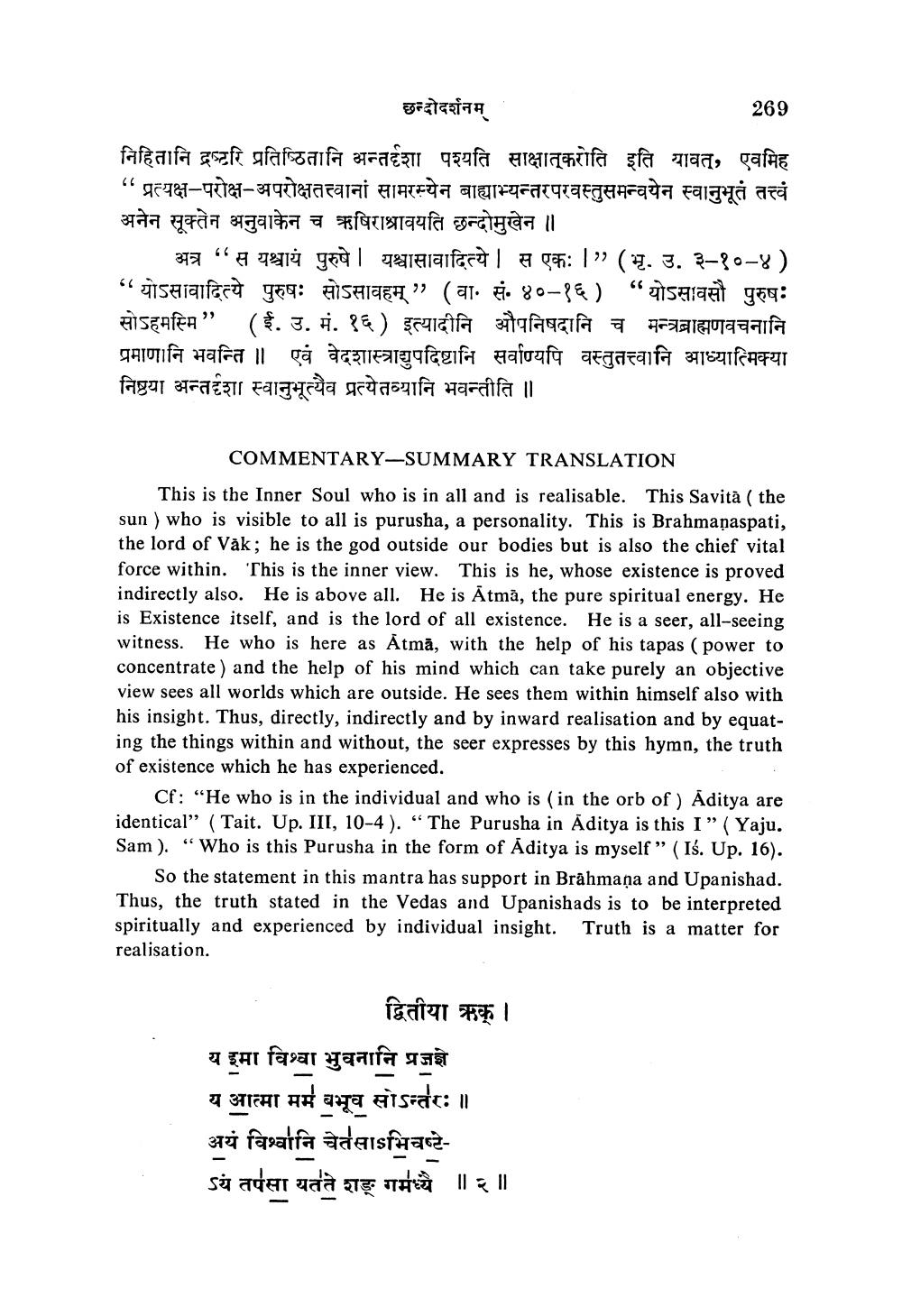________________
छन्दोदर्शनम्
269
निहितानि द्रष्टरि प्रतिष्ठितानि अन्तर्दृशा पश्यति साक्षात्करोति इति यावत्, एवमिह " प्रत्यक्ष - परोक्ष-अपरोक्षतत्त्वानां सामरस्येन बाह्याभ्यन्तरपरवस्तुसमन्वयेन स्वानुभूतं तत्त्वं अनेन सूक्तेन अनुवाकेन च ऋषिराश्रावयति छन्दोमुखेन ॥
66
अत्र स यश्चायं पुरुषे | यश्चासावादित्ये । स एकः | ” ( भृ. उ. ३-१०-४ ) " योऽसावादित्ये पुरुषः सोऽसावहम् " ( वा. सं. ४० - १६ ) " योऽसावसौ पुरुषः सोऽहमस्मि " ( ई. उ. मं. १६ ) इत्यादीनि औपनिषदानि च मन्त्रब्राह्मणवचनानि प्रमाणानि भवन्ति ॥ एवं वेदशास्त्राद्युपदिष्टानि सर्वाण्यपि वस्तुतत्त्वानि आध्यात्मिक्या निष्ठया अन्तर्दृशा स्वानुभूत्यैव प्रत्येतव्यानि भवन्तीति ॥
COMMENTARY-SUMMARY TRANSLATION
This is the Inner Soul who is in all and is realisable. This Savita ( the sun ) who is visible to all is purusha, a personality. This is Brahmanaspati, the lord of Vak; he is the god outside our bodies but is also the chief vital force within. This is the inner view. This is he, whose existence is proved indirectly also. He is above all. He is Atma, the pure spiritual energy. He is Existence itself, and is the lord of all existence. He is a seer, all-seeing witness. He who is here as Atmā, with the help of his tapas (power to concentrate) and the help of his mind which can take purely an objective view sees all worlds which are outside. He sees them within himself also with his insight. Thus, directly, indirectly and by inward realisation and by equating the things within and without, the seer expresses by this hymn, the truth of existence which he has experienced.
Cf: "He who is in the individual and who is (in the orb of) Aditya are identical" (Tait. Up. III, 10-4). "The Purusha in Aditya is this I" (Yaju. Sam). Who is this Purusha in the form of Aditya is myself" (Is. Up. 16). So the statement in this mantra has support in Brāhmaṇa and Upanishad. Thus, the truth stated in the Vedas and Upanishads is to be interpreted spiritually and experienced by individual insight. Truth is a matter for realisation.
द्वितीया ऋक् ।
इमा विश्वा भुवनानि प्रजज्ञे
य आ॒त्मा मम॑ ब॒भूव॒ सोऽन्त॑रः ॥
अयं विश्वा॑नि चेत॑साऽभचष्टे
ऽयं तप॑सा यतते शङ् गम॑ध्यै ॥ २ ॥




